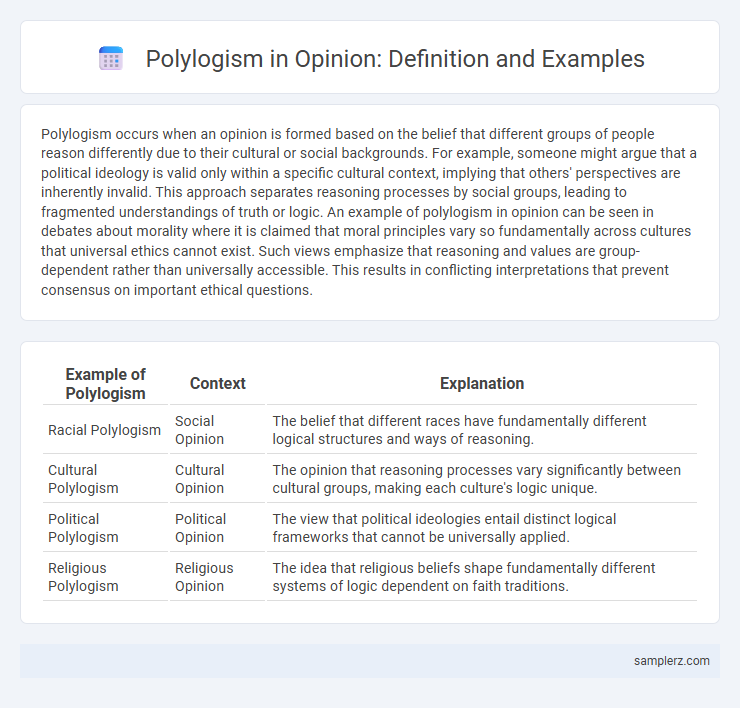Polylogism occurs when an opinion is formed based on the belief that different groups of people reason differently due to their cultural or social backgrounds. For example, someone might argue that a political ideology is valid only within a specific cultural context, implying that others' perspectives are inherently invalid. This approach separates reasoning processes by social groups, leading to fragmented understandings of truth or logic. An example of polylogism in opinion can be seen in debates about morality where it is claimed that moral principles vary so fundamentally across cultures that universal ethics cannot exist. Such views emphasize that reasoning and values are group-dependent rather than universally accessible. This results in conflicting interpretations that prevent consensus on important ethical questions.
Table of Comparison
| Example of Polylogism | Context | Explanation |
|---|---|---|
| Racial Polylogism | Social Opinion | The belief that different races have fundamentally different logical structures and ways of reasoning. |
| Cultural Polylogism | Cultural Opinion | The opinion that reasoning processes vary significantly between cultural groups, making each culture's logic unique. |
| Political Polylogism | Political Opinion | The view that political ideologies entail distinct logical frameworks that cannot be universally applied. |
| Religious Polylogism | Religious Opinion | The idea that religious beliefs shape fundamentally different systems of logic dependent on faith traditions. |
Defining Polylogism in Opinion-Based Discussions
Polylogism in opinion-based discussions refers to the belief that different groups or individuals have fundamentally distinct systems of logic or reasoning, leading to different "logics" rather than just different conclusions. This concept challenges the idea of universal rationality by asserting that opinions are shaped by varied cultural, social, or ideological frameworks that produce unique patterns of thought. Recognizing polylogism highlights the complexity of interpreting diverse viewpoints without imposing a single standard of logical evaluation.
Historical Examples of Polylogism Influencing Opinion
Historical examples of polylogism influencing opinion can be seen in apartheid-era South Africa, where laws and societal norms treated racial groups as fundamentally different in reasoning and morality, shaping public opinion and policy through these distinct worldviews. Similarly, the Soviet Union promoted Marxist-Leninist ideology as the exclusive framework for understanding social and economic issues, dismissing alternative perspectives as inherently flawed or bourgeois. These instances illustrate how polylogism fosters divergent cognitive patterns that reinforce ideological divisions and limit cross-cultural dialogue.
Polylogism in Political Opinion Formation
Polylogism in political opinion formation occurs when different groups base their political beliefs on fundamentally distinct logical frameworks, leading to varied interpretations of policies and ideologies. This phenomenon is evident in polarized societies where cultural, ethnic, or ideological divisions create incompatible reasoning patterns. Understanding polylogism helps explain why political debates often result in entrenched disagreements rather than consensus.
Polylogism and Confirmation Bias in Social Media
Polylogism often manifests in social media environments where confirmation bias reinforces users' preexisting beliefs through algorithm-driven echo chambers. These platforms prioritize content aligning with individual viewpoints, limiting exposure to diverse perspectives and deepening ideological divides. Consequently, polylogism combined with confirmation bias intensifies social polarization and hinders constructive discourse.
Cultural Polylogism Shaping Group Opinions
Cultural polylogism reveals how distinct cultural frameworks generate varying interpretations of social issues, shaping group opinions through deeply ingrained values and collective experiences. This phenomenon demonstrates that reason and logic are often contingent upon cultural contexts, leading to divergent perspectives between groups. Understanding cultural polylogism highlights the importance of cross-cultural dialogue to bridge opinion gaps and foster mutual respect among diverse communities.
Academic Debates: Polylogism Among Scholars
In academic debates, polylogism manifests when scholars argue from fundamentally different logical frameworks, leading to incommensurable conclusions despite examining the same evidence. This phenomenon is particularly evident in fields like philosophy and social sciences, where cultural or ideological premises shape distinct reasoning paths. Such polylogism challenges the possibility of objective consensus, emphasizing the role of underlying beliefs in shaping academic discourse.
Polylogism in Public Policy Opinions
Polylogism in public policy opinions manifests when stakeholders interpret economic inequality through fundamentally different logical frameworks, leading to conflicting recommendations for taxation and welfare programs. For example, proponents of a Marxist polylogism emphasize class struggle and advocate for wealth redistribution, while libertarian polylogism prioritizes individual liberty and minimal government intervention. These divergent logical systems complicate consensus-building in policymaking by framing societal issues through incompatible epistemologies.
Case Study: Polylogism in News Commentary
Polylogism manifests in news commentary when analysts interpret identical events through radically different ideological frameworks, producing conflicting narratives that reflect their distinct worldviews rather than objective facts. For example, political commentators may offer divergent explanations for economic data, attributing outcomes to systemic bias, market dynamics, or cultural values depending on their underlying assumptions. This case study highlights how polylogism complicates public understanding by embedding multiple, often incompatible logics within discourse.
Polylogism and Ideological Echo Chambers
Polylogism manifests in ideological echo chambers where differing belief systems shape conflicting logical frameworks, leading individuals to interpret facts through distinct, often incompatible reasoning processes. This cognitive segregation reinforces polarized opinions by restricting exposure to alternative perspectives and validating group-specific worldviews. Such compartmentalized logic undermines cross-ideological dialogue and perpetuates misunderstandings in public discourse.
Overcoming Polylogism for Balanced Opinions
Polylogism, the belief that different groups have fundamentally different logical systems, can distort objective opinion formation by imposing biased frameworks. Overcoming polylogism requires critical engagement with diverse perspectives and commitment to universal principles of reason and evidence. This approach fosters balanced opinions grounded in shared rational standards rather than cultural or ideological divisions.

example of polylogism in opinion Infographic
 samplerz.com
samplerz.com